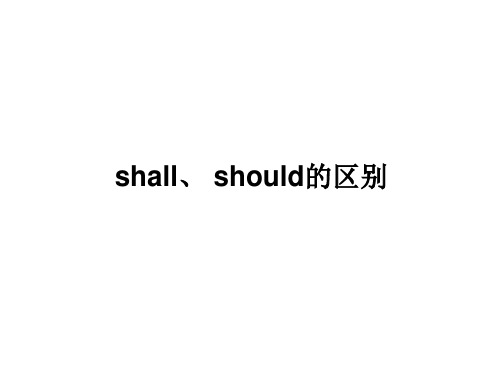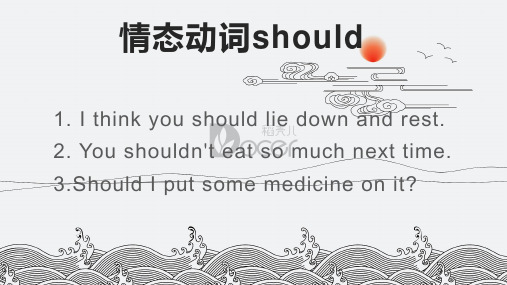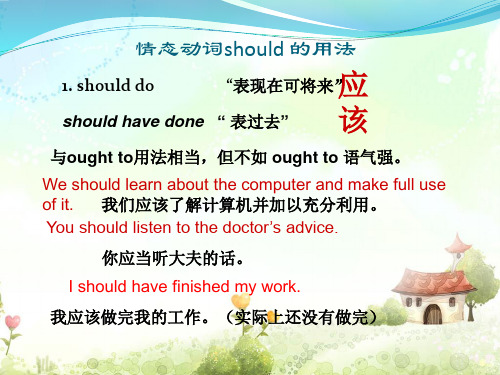should用法总结PPT课件
合集下载
shall、should的区别

【注】有时用于第一人称,表示决心
⑤I shall return. 我一定回来。(表示决心)
2. should的用法 should表示义务或责任。
①We should learn from each other. 我们应该互相帮助。
②We should help the aged. 我们应该帮助老人。
你为什么会那样想?
⑤How should I know? 我怎么会知道? ⑥How should I know? Who should come in but my
old friend Betty! 我当是谁进来时,原来是我的老朋友贝蒂呀!
我们今天晚上做什么呢? ③Shall the boy come at once?
要不要这孩子马上来?
shall在陈述句中的用法。
在陈述句中表示说话者的允诺、告诫、威胁、命令、规定、
必然性等,主要用于第二、三人称。
①You shall suffer for this. 你会为此事吃苦头的。(表威胁)
③You should pay your debts. 你应该还债。
should 表示建议或劝告,其意为“应该”。
①You should give up smoking. 你应该戒烟。
②You should go and ask your teacher. 你应该去问问老师。
【注】有时语气较强,含有命令的意味 ③You should leave at once.
--They should be ready by 12:00. 【注】should表示推断时,语气较肯定,通常是指非常 可能的事(因为暗示有一定的事实依据或合乎常理) 。
should 用于征求意见,主要用于第一人称的疑问 句形式。
⑤I shall return. 我一定回来。(表示决心)
2. should的用法 should表示义务或责任。
①We should learn from each other. 我们应该互相帮助。
②We should help the aged. 我们应该帮助老人。
你为什么会那样想?
⑤How should I know? 我怎么会知道? ⑥How should I know? Who should come in but my
old friend Betty! 我当是谁进来时,原来是我的老朋友贝蒂呀!
我们今天晚上做什么呢? ③Shall the boy come at once?
要不要这孩子马上来?
shall在陈述句中的用法。
在陈述句中表示说话者的允诺、告诫、威胁、命令、规定、
必然性等,主要用于第二、三人称。
①You shall suffer for this. 你会为此事吃苦头的。(表威胁)
③You should pay your debts. 你应该还债。
should 表示建议或劝告,其意为“应该”。
①You should give up smoking. 你应该戒烟。
②You should go and ask your teacher. 你应该去问问老师。
【注】有时语气较强,含有命令的意味 ③You should leave at once.
--They should be ready by 12:00. 【注】should表示推断时,语气较肯定,通常是指非常 可能的事(因为暗示有一定的事实依据或合乎常理) 。
should 用于征求意见,主要用于第一人称的疑问 句形式。
情态动词should的用法ppt课件

already.
A. needn’t
B. wouldn’t
C. mustn’t
D. shouldn’t
采用PP管及配件:根据给水设计图配 置好PP管及配 件,用 管件在 管材垂 直角切 断管材 ,边剪 边旋转 ,以保 证切口 面的圆 度,保 持熔接 部位干 净无污 物
高考链接
1. —Where is my dictionary? I remember I put it here yesterday.
采用PP管及配件:根据给水设计图配 置好PP管及配 件,用 管件在 管材垂 直角切 断管材 ,边剪 边旋转 ,以保 证切口 面的圆 度,保 持熔接 部位干 净无污 物
They shouldn’t left so soon.
mustn’t, shouldn’t
表禁止 had better not
采用PP管及配件:根据给水设计图配 置好PP管及配 件,用 管件在 管材垂 直角切 断管材 ,边剪 边旋转 ,以保 证切口 面的圆 度,保 持熔接 部位干 净无污 物
采用PP管及配件:根据给水设计图配 置好PP管及配 件,用 管件在 管材垂 直角切 断管材 ,边剪 边旋转 ,以保 证切口 面的圆 度,保 持熔接 部位干 净无污 物
5. 带should的习惯用语。
a. I should say (我敢说) he is over forty. b. She is over thirty, I should think(我相信)
What are you(I am suprised) that you should have so insulted our teacher?(表过去)
你是谁竟然对我们老师如此无礼?
采用PP管及配件:根据给水设计图配 置好PP管及配 件,用 管件在 管材垂 直角切 断管材 ,边剪 边旋转 ,以保 证切口 面的圆 度,保 持熔接 部位干 净无污 物
小学情态动词用法ppt课件

• I could swim when I was seven years old.
• (5)can开头的一般疑问句 以can和can’t 回答could开头的一般疑问句 以could和 couldn’t回答
为深入学习习近平新时代中国特色社 会主义 思想和 党的十 九大精 神,贯彻 全国教 育大会 精神,充 分发挥 中小学 图书室 育人功 能
二、特征
• 1.有一定词义,但不能单独作谓语,必须和行 为动词或系动词连用,构成谓语。
• 2.无人称和数的变化(have to例外:用于第三 人称单数时用has to)
• He has to stay here. • 3.后面接动词原形 • She should stay at home. • 4.具有助动词的作用,可用来构成否定句、疑
句中
• He can’t be in classroom. • (3)表示请求或允许,口语,“可以”相当
may
• You can go now.
为深入学习习近平新时代中国特色社 会主义 思想和 党的十 九大精 神,贯彻 全国教 育大会 精神,充 分发挥 中小学 图书室 育人功 能
• (4)could 是can的过去式,可以 会主义 思想和 党的十 九大精 神,贯彻 全国教 育大会 精神,充 分发挥 中小学 图书室 育人功 能
• 4.can’t 和 mustn’t • 否定推测:can’t “不可能” • mustn’t “禁止,不允许”,不能用于推
测 • must肯定句中表推测,“一定”
问句及简明回答 • --Can you sing an English song? • --yes, I can.
为深入学习习近平新时代中国特色社 会主义 思想和 党的十 九大精 神,贯彻 全国教 育大会 精神,充 分发挥 中小学 图书室 育人功 能
• (5)can开头的一般疑问句 以can和can’t 回答could开头的一般疑问句 以could和 couldn’t回答
为深入学习习近平新时代中国特色社 会主义 思想和 党的十 九大精 神,贯彻 全国教 育大会 精神,充 分发挥 中小学 图书室 育人功 能
二、特征
• 1.有一定词义,但不能单独作谓语,必须和行 为动词或系动词连用,构成谓语。
• 2.无人称和数的变化(have to例外:用于第三 人称单数时用has to)
• He has to stay here. • 3.后面接动词原形 • She should stay at home. • 4.具有助动词的作用,可用来构成否定句、疑
句中
• He can’t be in classroom. • (3)表示请求或允许,口语,“可以”相当
may
• You can go now.
为深入学习习近平新时代中国特色社 会主义 思想和 党的十 九大精 神,贯彻 全国教 育大会 精神,充 分发挥 中小学 图书室 育人功 能
• (4)could 是can的过去式,可以 会主义 思想和 党的十 九大精 神,贯彻 全国教 育大会 精神,充 分发挥 中小学 图书室 育人功 能
• 4.can’t 和 mustn’t • 否定推测:can’t “不可能” • mustn’t “禁止,不允许”,不能用于推
测 • must肯定句中表推测,“一定”
问句及简明回答 • --Can you sing an English song? • --yes, I can.
为深入学习习近平新时代中国特色社 会主义 思想和 党的十 九大精 神,贯彻 全国教 育大会 精神,充 分发挥 中小学 图书室 育人功 能
情态动词should

She isn't quiet herself today.她今天有点不舒服。 After a few days of rest,he was more himself again. 休息几天之后,他的身体好多了。
3.作主语或宾语的同位语,用来加强语气,可译成”亲 自,本人”,即使去掉,也不影响句子的完整性。
肯定句:主语+should+动词原形。。。。 否定句:主语+shouldn't/should not+动词原形+。。。。 一般疑问句:Should+主语+动词原形+。。。?
用法: 1.表示征求建议,常用于第一,三人称作主语的句子中。 Should I trust him? What should he do?
4.作shall的过去式,用于主语是第一人称的句子中, 表示打算或期望做的事情。
He told me that we should be leaving the next day.
反身代词
1.He hurt himself 2.Jenny cut herself. 3.I hurt myself playing soccer.
表示反射或强调的代词叫反身代词。它表明动作反射回 动作执行者本身,既动作的执行者与承受者互指。
1.作动词或介词的宾语,表明宾语和主语是同一个/些人 或事物。
Maria bought herself a scarf.
We must look after oursel是主语,通常描述身体, 精神等方面的感觉或状态。
情态动词should
1. I think you should lie down and rest. 2. You shouldn't eat so much next time. 3.Should I put some medicine on it?
3.作主语或宾语的同位语,用来加强语气,可译成”亲 自,本人”,即使去掉,也不影响句子的完整性。
肯定句:主语+should+动词原形。。。。 否定句:主语+shouldn't/should not+动词原形+。。。。 一般疑问句:Should+主语+动词原形+。。。?
用法: 1.表示征求建议,常用于第一,三人称作主语的句子中。 Should I trust him? What should he do?
4.作shall的过去式,用于主语是第一人称的句子中, 表示打算或期望做的事情。
He told me that we should be leaving the next day.
反身代词
1.He hurt himself 2.Jenny cut herself. 3.I hurt myself playing soccer.
表示反射或强调的代词叫反身代词。它表明动作反射回 动作执行者本身,既动作的执行者与承受者互指。
1.作动词或介词的宾语,表明宾语和主语是同一个/些人 或事物。
Maria bought herself a scarf.
We must look after oursel是主语,通常描述身体, 精神等方面的感觉或状态。
情态动词should
1. I think you should lie down and rest. 2. You shouldn't eat so much next time. 3.Should I put some medicine on it?
虚拟语气用法总结超好ppt课件.ppt

1. if从句中, 省略if,were,had,should可以放在句 认识到了贫困户贫困的根本原因,才能开始对症下药,然后药到病除。近年来国家对扶贫工作高度重视,已经展开了“精准扶贫”项目 首,(用于倒装结构),否定词not不能放在前面。
1.If I were you, I would accept his advice. Were I you,……
It is necessary that_h__e_b_e__s_e_n_t_to__B_e_i_ji_n_g_________. 有必要派他去北京。
认识到了贫困户贫困的根本原因,才 能开始 对症下 药,然 后药到 病除。 近年来 国家对 扶贫工 作高度 重视, 已经展 开了“ 精准扶 贫”项 目
He hesitated for a moment before kicking the ball, otherwise he _____ a goal.
• had scored • scored • would score A.would have scored
认识到了贫困户贫困的根本原因,才 能开始 对症下 药,然 后药到 病除。 近年来 国家对 扶贫工 作高度 重视, 已经展 开了“ 精准扶 贫”项 目
_____________________.
认识到了贫困户贫困的根本原因,才 能开始 对症下 药,然 后药到 病除。 近年来 国家对 扶贫工 作高度 重视, 已经展 开了“ 精准扶 贫”项 目
• It is required that you ____ at six.
• will arrive C. arrived
认识到了贫困户贫困的根本原因,才 能开始 对症下 药,然 后药到 病除。 近年来 国家对 扶贫工 作高度 重视, 已经展 开了“ 精准扶 贫”项 目
情态动词should的用法

Practice
1. It was really very dangerous; you ______ him seriously. A. might have injured B. could injure C. should have injured D. must injure
2. — “________ you mind my opening the window?” — “Not at all.” A. Shall B. Should C. Will D. Would
3. I didn’t hear the phone. I ______ asleep. A. must be C. should have B. must have been D. could have bee
4. You _______ pay more attention to your spelling next time. A. would B. should
已是3点钟了,足球比赛开始了。
4. 在疑问句中表示惊讶、不合理、难以置信或不应说的事。 例如: Why should I go? 我干嘛要去?(不满) Why should he publish such a book? 为何他竟会出版这种书? Why should you be sorry about the news? 你为何对这消息感到难过? Should he do such a thing? 他会做这种事吗? How should I know? 我怎么会知道? Who should write it but himself? 不是他自己还有谁会写呢?
但当表示“应该”时,should 更侧重自己主观的看法, 而 且ought to 更着重客观的情况。
人教版初中英语八年级上册【看漫画学语法】情态动词should的用法
Will you pass me the book? 你能帮我把书递过来吗?
易错点3
should have done的用法
should与现在完成时相结合构成“should have done” 结构:表示对过去事情的虚拟推测,意为“应该做 过某事”(而事实上并没有做)。
I should have finished my homework by the end of last week. 上周末,我本应该写完作业的。
否定句:should后加not(缩写为shouldn’t)
You should not (shouldn’t) run faster.
一般疑问句:should提前
Should I run faster?
看漫画找规律
请找出漫画中所有情态动 词。这些情态动词分别表 达什么含义呢?
Will you show me how to play the piano, Uncle Jack? OK, come and sit here and I’ll tell you what to do.
— It was great fun. You____ have come.
A. must
B. can
C. should
D. may
1. 表示建议时,意为“应当”。
例:You should see a dentist. 你应当去看牙医。
should
2. 表示义务或责任时,意为“应该”。
例:We should respect the old. 我们应该尊重老人。
3. 表示要求与命令时,意为“应该”。
例:You should listen to the teacher carefully in class. 在课堂上,你应该认真听老师讲课。
易错点3
should have done的用法
should与现在完成时相结合构成“should have done” 结构:表示对过去事情的虚拟推测,意为“应该做 过某事”(而事实上并没有做)。
I should have finished my homework by the end of last week. 上周末,我本应该写完作业的。
否定句:should后加not(缩写为shouldn’t)
You should not (shouldn’t) run faster.
一般疑问句:should提前
Should I run faster?
看漫画找规律
请找出漫画中所有情态动 词。这些情态动词分别表 达什么含义呢?
Will you show me how to play the piano, Uncle Jack? OK, come and sit here and I’ll tell you what to do.
— It was great fun. You____ have come.
A. must
B. can
C. should
D. may
1. 表示建议时,意为“应当”。
例:You should see a dentist. 你应当去看牙医。
should
2. 表示义务或责任时,意为“应该”。
例:We should respect the old. 我们应该尊重老人。
3. 表示要求与命令时,意为“应该”。
例:You should listen to the teacher carefully in class. 在课堂上,你应该认真听老师讲课。
should用法总结.ppt
• 万一你来不了,就叫陈夫人代替你。
• If it should rain tomorrow, I wouldn't go. 〔= Should it rain tomorrow, I wouldn't go.〕
• 万一明天天下雨,精我最选新文就.档 不去了。
4
• 四 . should 作为情态动词,可以表示谦逊、客气、 委婉之意,译为“可……〞、“倒……〞。例如:
• It is wonderful that you should have achieved so much these years.
• 这几年你竟然取得如此大的成就,你真了不起。
精最选新文.档
16
• 此外, should 还可以出现在“ should be doing sth 〞或“ should have been doing sth 〞等句式 中,表示“应该正在……〞或表示说话人的某种不 满情绪。例如:
〔should〕 do more eye exercises every
day.
精最选新文.档
12
• 5. 用在“ It is / was necessary/ important/ strange/ incredible 〞或“ It is a pity/ a shame/ no wonder 〞之后由 that 引导的主语从句中, should 有“应该〞、“必须〞、“竟然〞、“居然 〞之意。例如:
• 我想现在他们总该到家了吧。
• The report was written after a careful investigation, so it should be reliable.
• 这份报告是经过周密调查后才写成的,所以
英语课件 can和should的用法和辨析
5.He ___s_h__o_u__ld__ __b_r_u__s_h____his teeth in the morning and before bedtime.He _s_h__o_u__ld__n_'_t__ ___e_a_t_____ too many sweets.
Can和should不同点
1.表示能力(体力、知识、技能等), 意思是能,会/不能,不会。
2.表示猜测,语气比较强硬, 意思可能/不可能。
3.可做名词, 意思是罐头。
1.表示“劝告、建议”时, 可译成“应该”/“不应该”。
2.表示猜测,语气委婉, 突出把握性,留下万一性。 可译成“应该会”/“想必会”。
知识点系列
义务教育教科书小学英语五年级下册 Unit4 Seeing the doctor
作者
Can的含义
01 表示能力(体力、知识、技能等),意思是能,会/不能,不会。
例如:玛丽不会说英语。 Mary can’t speak English. 练习:你能画得好。 You can paint well.
03
表示猜测,可译成“应该会”/“想必会”/“万一”。
例如:12点应该会好。 It should be ready by 12:00.
练习:万一明天下雨...... Should it rain tomorrow,...
should(情态动词)的结构
1. 肯定句: should + V原(动词原形)
3. 一般疑问句: should 提到句首。should+主+V原+其 它?练习: He should have a good rest.改成一般疑问句。
Should he have a good rest? Yes, he should./ No, he shouldn't.
You should You shouldn't句型操练PPT课件
1.You _s_h_o_u_ld say hello to your friends. 2.She s_h_o__u_ld_n_’t put the book on the floor. 3.He s_h_o__uld listen to the teacher carefully. 4.You _s_h_o_u_ld_n__’t shout loudly. 5.We _s_h_o_u_ld__n_’t run in the street. 6.They s_h_o__u_ld eat some fruits.
You shouldn’t walk on the grass.
You shouldn’t jump on the bed.
You shouldn’t take photos.
You should wash your trousers.
You should help your mother.
tidy v.(整理)/adj.(整洁的)
You should tidy your toys.
The room is tidy now.
Sam is tidying his toys.
Then you’re going to help me tidy up.
You should tidy your toys.
结束语
当你尽了自己的最大努力时, 失败也是伟大的,所以不要放 弃,坚持就是正确的。
When You Do Your Best, Failure Is Great, So Don'T Give Up, Stick To The End
感谢你的到来与聆听 学习并没结束,希望
继续努力
Thanks for listening, this course is expected to bring you value and help
You shouldn’t walk on the grass.
You shouldn’t jump on the bed.
You shouldn’t take photos.
You should wash your trousers.
You should help your mother.
tidy v.(整理)/adj.(整洁的)
You should tidy your toys.
The room is tidy now.
Sam is tidying his toys.
Then you’re going to help me tidy up.
You should tidy your toys.
结束语
当你尽了自己的最大努力时, 失败也是伟大的,所以不要放 弃,坚持就是正确的。
When You Do Your Best, Failure Is Great, So Don'T Give Up, Stick To The End
感谢你的到来与聆听 学习并没结束,希望
继续努力
Thanks for listening, this course is expected to bring you value and help
- 1、下载文档前请自行甄别文档内容的完整性,平台不提供额外的编辑、内容补充、找答案等附加服务。
- 2、"仅部分预览"的文档,不可在线预览部分如存在完整性等问题,可反馈申请退款(可完整预览的文档不适用该条件!)。
- 3、如文档侵犯您的权益,请联系客服反馈,我们会尽快为您处理(人工客服工作时间:9:00-18:30)。
• He is working hard for fear that he should fall behind others.
• 他努力工作,唯恐落在别人后面。
• We went over the document again and again lest we should miss any of the main points.
• If it should (或 were to ) rain tomorrow, the sports meeting would be put off.
• = Should it rain tomorrow/ Were it to rain tomorrow, the sports meeting would be put off.
.
2
• 二 . should 情态动词,通常用来表示现在或将 来的责任或义务,译作“应该”、“应当”,这 时它可以和 ought to,
be supposed to 互换使用。例如:
• You should (= are supposed to ) complete your test in time.
• 万一你来不了,就叫陈夫人代替你。
• If it should rain tomorrow, I wouldn't go. (= Should it rain tomorrow, I wouldn't go.)
• 万一明天天下雨,我就不去了。
.
4
• 四 . should 作为情态动词,可以表示谦逊、客气、 委婉之意,译为“可……”、“倒……”。例如:
• 他倒是希望他们的篮球队赢得这场比赛的胜利。
.
5
• 五 . should 作为情态动词,可以用来表示意外、 惊喜或者在说话人看来是不可思议的。尤其在 以 why, who, how 等开头的修辞疑问句或某 些感叹句中常常译为“竟会”、“居然”。例 如:
• How should I know it ? 我怎么会知道这件事?
• ②可将 should 置于从句之首,即将 should 放 在主语前面,而省略从属连词 if .例如:
• If you should fail to come, ask Mrs Chen to work in your plcome, ask Mrs Chen to work in your place. )
• I should say that it would be better to try it again. • 我倒是认为最好再试一试。 • You are mistaken, I should say. 据我看,你搞错
了。
• He should expect their basketball team to win the match.
• 我们把文件看了一遍又一遍,唯恐忽略了其中 的什么要点。
• He took an umbrella in case (that) it should rain.
• 他带了一把雨伞,以.防天下雨。
8
• 八 . should 作为情态动词,可以用于下列虚拟语 气句中:
• 1. 用在表示与将来事实相反的条件状语从句中, 构成“ If …… should (do sth)……, …… would/ could/ might (do sth.) …… ”句式。例如:
• 我不明白为什么他居然不愉快。
.
6
• 六 . should 作为情态动词,可以用来表示有较 大可能实现的猜测、推论,通常译为“可能”、 “总该……吧”,相当于 be expected to .例如:
• They should be home by now, I think.
• 我想现在他们总该到家了吧。
• 如果明天天下雨,运动会就会延期举行。
.
9
• 2. 用在 suggest (propose), arrange, plan, decide,, advise, order, demand, request, desire, insist 等表示“建议”、“要求”、“命 令”、“决定”、“安排”、“计划”、“主张” 的动词后面接的宾语从句中。这里的 should 也可 以省略。例如:
• Why should you be so late today ? 你今天怎么 来得这么晚?
• When I went out, whom should I meet but my old friend Xiao Li ! 当我出去时,想不到竟会 碰见我的老朋友小李!
• I don't see any reason why he shouldn't be happy.
should
.
1
• 一 . should , shall 的过去式,可以在间接引 语中与第一人称主语搭配,表示过去将来 时间。例如:
• The group leader announced that we should (= would ) begin to work soon.
• A week ago, I told him that I should (= would) go to Beijing the next day.
• 你们应该按时做完你们的实验。
• You should (= ought to ) tell your mother about it at once.
• 你应该立即把此事告诉你妈妈。
.
3
• 三 . should 情态动词,
• ①用在条件状语从句中,表示语气较强的假 设,译作“万一”、“竟然”;
• The report was written after a careful investigation, so it should be reliable.
• 这份报告是经过周密调查后才写成的,所以 应该是可靠的。
.
7
• 七 . should 作为情态动词,用在由 so that, for fear that, lest 引导的目的状语从句和 in case (that) 引导的条件状语从句中,有“能够”、 “可能”、“会”之意。例如:
